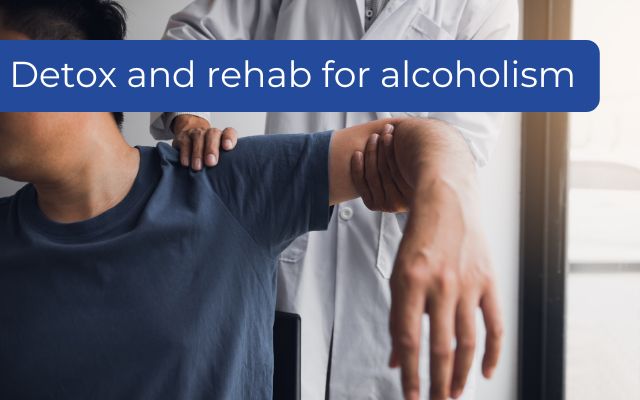
Recognising Alcohol Dependence and When to Seek Detox
Are your drinking patterns showing signs of alcohol dependence that require medical detox and specialist rehabilitation support?

Alcohol use disorder (AUD) is split into mild, moderate and severe and more extreme cases need detox and rehab for alcoholism.
Alcoholism is chronic and marked by an uncontrollable urge to consume alcohol despite harmful consequences. It’s not mild abuse; it’s a severe disorder. The brain undergoes changes making resistance to drinking almost impossible. This causes significant personal distress to the alcoholic and those close to them.
People with severe AUD experience physical and mental withdrawal symptoms when they try stop drinking. These withdrawal symptoms are potentially dangerous and should not be attempted without medical detox from alcohol.
The Detox – Withdrawal
6-24 hours after the last drink, with or without the presence of alcohol in the person’s bloodstream, withdrawal symptoms may begin. Symptoms will vary in severity from person to person and may include:
- Anxiety
- Depression
- Sweating
- Nausea and vomiting
- Delirium tremens (DTs), restlessness, confusion, fever, hallucinations, and seizures. This is a life-threatening symptom.
- Hallucinations
- Sleep disturbances
- Shakiness, (mainly in the hands)
- Unpredictable changes in blood pressure and heart rate
How do you know if you or someone you love needs assisted detox?
The easiest way to know is to answer one question. Do they drink alcohol just to feel normal? If they require a drink just to function then the chances are that they need detox and rehab for alcoholism.
It cannot be emphasized enough that in severe cases, stopping drinking alcohol abruptly without detox and rehab for alcoholism can be fatal. Detoxification is a medical process that requires professional help in order to be successful and safe.
The worst symptoms of withdrawal typically happen between hours 24 and 72 and the rate of seeing the detox through to completion is increased when you have medication to help ease the symptoms and support at hand.
The Detox and Rehab Process
In order to map the type of support required by the person seeking treatment, an initial assessment is conducted. This includes tests to determine physical and mental health, discussing the problematic drinking history, and may also require blood work.
When this is complete a detox plan will be implemented. This may include medication to ease the symptoms of withdrawal and support and/or treatment for any other concerns that may arise. Temperature, heart rate as well as blood pressure, and breathing will be checked routinely.
The objective of the detox is to help the person become mentally and physically stronger so that they are able to take part in treatment that will help them to break the cycle of addiction.
Different Treatment Options
Before going in for detoxification from alcohol it may be worth it to consider a few of the available options in advance as an informed decision may improve the outcome significantly.
The most common options for detox and rehab for alcoholism are:
Inpatient: This treatment is a live-in option and usually includes detox and 24-hour care during the process.
Outpatient: This treatment option allows you to receive treatment and/or medication during the day but you continue to live at home.
Inpatient detox and rehab for alcoholism treatment offers a wide range of services but can cost substantially more than outpatient treatment. Outpatient treatment is far more affordable and is typically an effective option for those who have mild withdrawal. Outpatient services are suitable for people who have good mental and physical health without a long history of delinquent drinking.
Detox and rehab for alcoholism treatment programmes may include services ranging from medical care and mental health treatment to Cognitive behavioural therapy (CBT) and counselling aimed at preventing relapse.
Inpatient detox and rehab for alcoholism treatment at a medical facility or hospital is less common than it used to be but should not be ruled out in the presence of severe medical or mental health problems.
Residential detox and rehab for alcoholism facilities usually run programmes for a period of 1-3 months, longer if additional treatment is required. This is the better option for those who struggle to remain sober.
Day treatment or partial hospitalization offers daily treatment (Weekdays) and the person continues to live at home.
Intensive outpatient detox and rehab for alcoholism treatment include scheduled sessions that are longer and more probative than conventional outpatient treatments. This form of treatment can be engaged in after any of the available programmes or as the first line of treatment.
Online programmes: With the current issues relating to the COVID-19 pandemic, a need for more innovative methods of treatment has brought about some inventive ways in which to engage without the physical risk of contact. Intensive one-on-one and group sessions are now easily available via Zoom or similar platforms. This allows people suitable alternatives to treatment within a facility or as a means of maintenance treatment.
I was sceptical about rehab, but Changes proved me wrong. Their holistic treatment approach addressed not just my addiction, but also the underlying issues. I’m now living a healthy, fulfilling life.
Thank you for all the help on my recovery. It really makes a huge difference in my life. Changes has provided me with everything I need to navigate my new, sober life and actually live again.
Safe, confidential and thorough treatment helped me through a very difficult period in my life. Changes provided me with tools and skills to manage my illness and introduced me to a supportive network of people.
I began my treatment at Changes almost 5 years ago. I was a very broken, lost soul and experienced the amazing program and support of my therapist and peers. It was a life-changing time for me.
My first interaction with Changes gave me peace of mind. I knew that they would help. Thank you for looking after my son so well. You made a world of difference, not only in his life but also mine.
Choosing the Detox and Rehab for Alcoholism Programme
A needs assessment is a good way to start.
Consider the following questions as you set out to choose a comprehensive programme that will take care of your personal requirements:
- What medical or mental health issues do you have?
- What type of support base do you have?
- How long have you had a problem with drinking?
If you are in general good health and have not been drinking for very long, an outpatient programme may be the right choice for you. In the event that you have multiple issues and a longer history of problem drinking, it may be best to consider an inpatient detox and rehab for alcoholism treatment option.
Once you have dealt with these questions you can look into treatment that provides licensed quality care with a high success rate and that falls within your affordability bracket.
You may want to consider asking the following questions of potential detox and rehab for alcoholism treatment facilitators:
- Do you accept medical aid?
- How is your staff trained and are they licensed?
- Can you send an outline of the treatment plan?
- Do you offer counselling and medical services?
- Do you have a relapse prevention programme in place?
- Is there aftercare when I’m done with the program?
Detox and Rehab for Alcoholism Medical Aid Cover
Addiction treatment services fall under the PMB (Prescribed minimum benefits) in South Africa and as such 3 weeks of treatment are covered according to the particular scheme’s rates. There may be a shortfall or copayment that must be made out of pocket depending on the rates of the chosen treatment facility. It is a good idea to get hold of your medical aid and ask them exactly how it works and what they cover.
Follow-up care / long-term recovery
It is wise to view the detox and rehab for alcoholism treatment of alcohol use disorder as ongoing, as is the case with all other chronic illnesses, like diabetes or asthma. Once all of the treatments and sessions slow down and a sense of normality returns, the possibility of relapse becomes higher. Follow-up care for at least a year will minimize the likelihood of relapse significantly. 12-step programmes, one-on-one therapy, and peer group therapies are great options to bolster long-term recovery.
There is always hope and help available for detox and rehab for alcoholism. Changes Rehab Johannesburg is here to guide and support you through each step.
Call 081-444-7000 or email [email protected] to get the help you need today.
Worried your drinking needs detox? Spot clear signs of alcohol dependence, learn when medical detox and specialist rehab are needed and where to get help. Changes team counsellors are here to help you.Detox Signs How To Know There Is An Alcohol Problem










